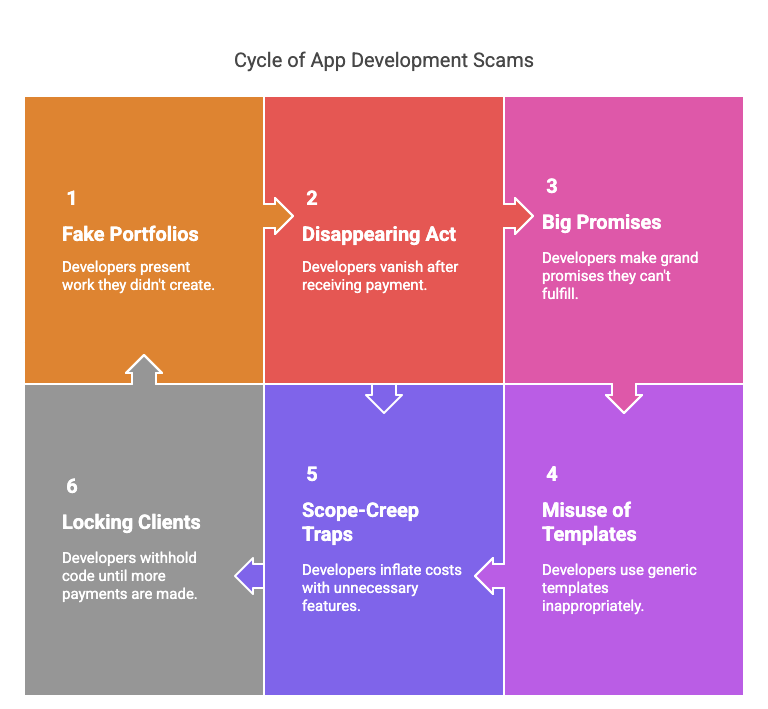|
Getting your Trinity Audio player ready...
|
Developing an application is the most significant opportunity of our era. Everyone wants to join, but it’s rare to walk away from such an endeavor with more money than they started with. Suppose you’re a founder or business owner considering mobile app development. In that case, you’ve likely encountered or heard terrifying tales of developers abandoning half-built apps and budget balloons that never made it to market. Unfortunately, scams abound in this area, and they do tend to cost a lot to clean up.
Assume a startup founder hired a developer from an online platform promising to build an elegant, rich-featured app without exceeding two weeks for just a few hundred dollars. In the middle, the developer falls out of sight. The developer deleted the file without providing the source code. No refund. No footprints. Not only has he gone, but he has taken months of forward movement along with credibility with him. Such an event is not rare—too often, it leaves businesses scrambling to recover. This guide covers the most common app development scams, warning signs, and how to protect yourself before and during your project. We will also show you how working with a transparent and established partner like Esferasoft can make all the difference.
Why App Development Scams Are So Common

Development myths take full advantage of a shaky terrain in trust amidst uneven literacy levels in understanding technology. This article explains much about why such impostures occur:
1. Low Cost of Entry
All an aspiring person needs is a laptop and a simple internet connection; he/she is an “app developer”. Lack of universally applicable certifications or vetting on the part of platforms like Fiverr, Freelancer, or Upwork makes it easy for scammers to set up shop in no time and disappear as quickly.
2. Non-Technical Founders
Most owners or founders of a startup are visionary people and not coders. Accompanied with this knowledge gap goes a stream of buzzwords, technical jargon, and promises that are unrealistic.
3. The Temptation of Cheap and Fast
Let’s be honest: who wouldn’t want an app built within two weeks for less than $1,000? The problem is that professional app development doesn’t work that way. Scammers exploit this temptation by offering something that sounds remarkably attractive but is sufficiently empty—or worse.
4. Work outside and Payment gaps.
The hiring of employees is standard, while it is more complicated at law levels. Different time zones, communication lags, and varied business laws mean that accountability enforcement is extremely difficult.
5. Fake Portfolios and Stealing of Works
With open access to app stores, GitHub, and design portfolios, scammers tend to cobble together false work to pass them off as their own. Those founders who don’t check thoroughly may fall prey to polished presentations without substance.
Common Types of App Development Scams
Identifying what scams are helps you to serve as an early troubleshooter.
These are the common ways:
● Fake Portfolios or Cloned Apps
Very often, these developers take credit for apps they did not build themselves and sometimes even showcase their award-winning designs taken from agencies or open-source libraries.
● The Disappearing Act
After you make a deposit, they usually stop communication: these developers cease responding to emails, sometimes block their clients in messengers, and sometimes actually disappear along with stealing their money, albeit handing over half-baked or buggy code as a delay tactic.
● Big Promises And Little Delivery
The loud first promise then becomes commonplace in a scam: “AI-integration”, “e-commerce-ready”, and “scalable backend”, but the delivery never gets close.
● Misuse of Open Source Templates
Instead of using custom solutions, many developers opt for off-the-shelf templates, which can result in misrouted, non-unique, unscalable, and maintenance-intensive applications.
● Scope-Creep Traps
Not properly defined scope; they request more money for each feature, adding to an endless loop of upselling under the guise of “feature updates”.
● Locking Clients from Code
A scammer might hold your source code against you until additional payments are made, asking for it by “policies” or “still being finalized”.
Red Flags to Watch Out For
These early warning signs should immediately raise your guard:
- A website with broken links, no portfolio, or generic template content
- Prices are significantly lower than the market standard without explanation
- Communication that relies solely on chat—no calls, no video
- Avoidance of formal contracts or insistence on WhatsApp or Telegram as the only channel
- Hesitation to provide progress updates or code until final payment
- No itemized estimates or vague terms like “end-to-end solutions” without specifics
How to Protect Yourself Before Hiring
Research appropriately minimizes the possibility of catastrophic losses. Before beginning any project, take the following steps:
● Verify the Company or Individual
Consult Clutch and LinkedIn and search for them on Google. Try to speak to previous clients. Real agencies will not shy away from providing references.
● Ask for Case Studies, Not Just Screenshots
Ask for documented case studies outlining the client’s problem, delivered solution, and outcomes. One can only make fake screenshots.
● Meet Them by Video Calls
Learn to trust by seeing faces, places, and demeanors. Do not trust those developers who are only communicating through email or chat.
● Keep contracts legal
This means having an NDA and a project agreement that may include, among others, deliverables, deadlines, payment structure, IP ownership, rights, and exit clauses.
● Payment to be made by Milestones through Escrow
For example, Upwork and Freelancer have types of escrow systems. Otherwise, even though you can use Payoneer or Stripe milestone models for this arrangement to secure both parties.
Best Practices During the Project
You know that if you are active, engaged, and organized in a project, you will not escalate problems.
● Get Access from the Start
Request access to repos (like GitHub or Bitbucket) so that you can monitor its progress and ensure that code is regularly pushed.
● Weekly Demos or Builds
Make sure every milestone is contained in a tangible output — something like a clickable prototype, a function build, or a back-end integration.
● Keep Documentation on All Communication
Project communications are now done over Slack or Trello. Email threads should be organized and timestamped. This technique comes in handy if there is ever a disagreement over work.
● Track Bugs and Requests
Keeping a bug tracker (like Jira, Asana, or GitLab) and ensuring fixes are logged, tested, and confirmed adds structure to the delivery process.
● Stay Within Scope
Avoid adding features during the project without change requests — the changes should also have a timeline and cost adjustments.
What to Do If You’ve Already Been Scammed

If you’ve been scammed, you must act quickly.
● Report the Incident
Notify the platform you hired through. Post your complaints on Trustpilot, Clutch, etc.
● Dispute the Payment
If your payment was made through PayPal, bank transfer, or credit card, get this dispute process started right away. Get some or all of the money back.
● Legal Advisement
Even in cases of international contracts, legal people can help in discerning the situation as long as it deals with a big sum.
● Do Some Hand-Wringing
Put down how you think it all went wrong. This internal audit will help you avoid making the same mistakes in the future.
● Save What Can Be Saved
Seek a second opinion from a reputable agency to determine the salvageable parts of the project. Do this while instituting sufficient checks against similar future risks.
Why Esferasoft Is a Trustworthy App Development Partner
Esferasoft offers investment in knowledge; it does not offer gambling. This distinction is what sets us apart:
- More than a Decade of Eventual Reliability
We have successfully accomplished numerous projects in healthcare, fintech, logistics, and e-commerce.
- Real People, Real Proof
Visit our website, view real employee profiles on LinkedIn, and speak directly to our past clients.
- Dedicated Project Managers
Each client is assigned a PM to ensure consistent communication and on-time delivery.
- Clear Process Flow
From Figma designs to GitHub commits, you will see progress at each level. We believe in zero surprises.
- Your Code, Your Property
All assets, designs, and code are yours from day one. No hidden licensing fees, no access restrictions.
Moving Forward with Confidence
Your App Deserves More Than Promises—It Deserves Protection
Scams in the app development business may be lamentable, but they are also avoidable, as this guide shows. Information and preparation are your best armor against scams.
When launching a new app or improving an existing one, it should always be methodically planned, carried out, and put in place on a foundation of transparency and trust. By understanding how scams work and identifying potential red flags, you may save yourself from making an expensive mistake that ultimately delays the project.
At Esferasoft, we value lifetime partnerships. We are here to make certain that your vision becomes a product that you can proudly launch into the market and scale, with over ten years of proven experience, a full-fledged in-house team, and a long-standing reputation.
Receive a comprehensive project roadmap from us with no obligations by schedule during a free consultation today. No hype, just clear answers, smart strategies, and real support

